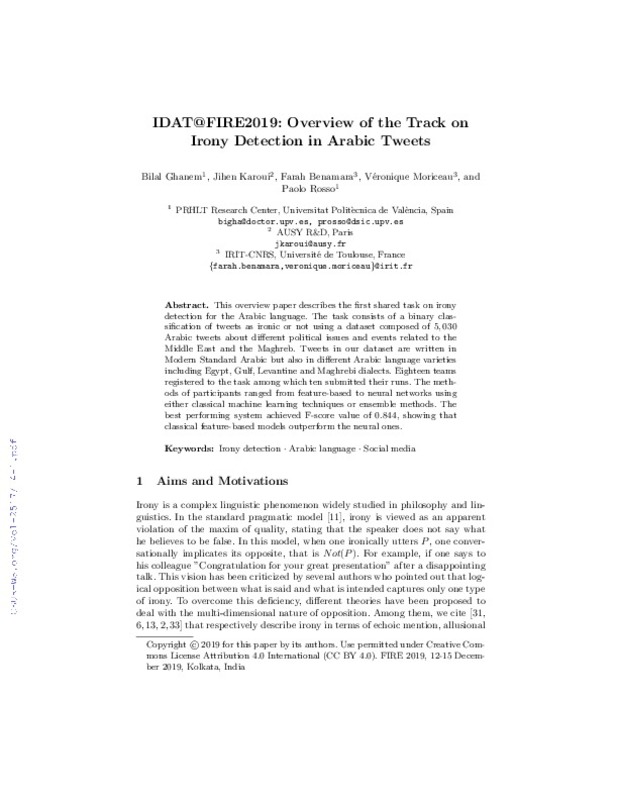JavaScript is disabled for your browser. Some features of this site may not work without it.
Buscar en RiuNet
Listar
Mi cuenta
Estadísticas
Ayuda RiuNet
Admin. UPV
IDAT@FIRE2019: Overview of the Track on Irony Detection in Arabic Tweets
Mostrar el registro sencillo del ítem
Ficheros en el ítem
| dc.contributor.author | Ghanem, Bilal
|
es_ES |
| dc.contributor.author | Karoui, Jihen
|
es_ES |
| dc.contributor.author | Benamara, Farah
|
es_ES |
| dc.contributor.author | Moriceau, Véronique
|
es_ES |
| dc.contributor.author | Rosso, Paolo
|
es_ES |
| dc.date.accessioned | 2022-02-11T08:06:32Z | |
| dc.date.available | 2022-02-11T08:06:32Z | |
| dc.date.issued | 2019-12-15 | es_ES |
| dc.identifier.issn | 1613-0073 | es_ES |
| dc.identifier.uri | http://hdl.handle.net/10251/180744 | |
| dc.description.abstract | [EN] This overview paper describes the first shared task on irony detection for the Arabic language. The task consists of a binary classification of tweets as ironic or not using a dataset composed of 5,030 Arabic tweets about different political issues and events related to the Middle East and the Maghreb. Tweets in our dataset are written in Modern Standard Arabic but also in different Arabic language varieties including Egypt, Gulf, Levantine and Maghrebi dialects. Eighteen teams registered to the task among which ten submitted their runs. The methods of participants ranged from feature-based to neural networks using either classical machine learning techniques or ensemble methods. The best performing system achieved F-score value of 0.844, showing that classical feature-based models outperform the neural ones. | es_ES |
| dc.description.sponsorship | This publication was made possible by NPRP grant 9-175-1-033 from the Qatar National Research Fund (a member of Qatar Foundation). The findings achieved herein are solely the responsibility of the last author. The work of Paolo Rosso was also partially funded by Generalitat Valenciana under grant PROMETEO/2019/121. | es_ES |
| dc.language | Inglés | es_ES |
| dc.publisher | CEUR-WS.org | es_ES |
| dc.relation.ispartof | Working Notes of FIRE 2019 . CEUR-WS.org, vol. 2517 | es_ES |
| dc.rights | Reconocimiento (by) | es_ES |
| dc.subject | Irony detection | es_ES |
| dc.subject | Arabic language | es_ES |
| dc.subject | Social media | es_ES |
| dc.subject.classification | LENGUAJES Y SISTEMAS INFORMATICOS | es_ES |
| dc.title | IDAT@FIRE2019: Overview of the Track on Irony Detection in Arabic Tweets | es_ES |
| dc.type | Comunicación en congreso | es_ES |
| dc.type | Artículo | es_ES |
| dc.relation.projectID | info:eu-repo/grantAgreement/QNRF//NPRP 9-175-1-033//Arabic Author Profiling for Cyber-Security/ | es_ES |
| dc.relation.projectID | info:eu-repo/grantAgreement/GVA//PROMETEO%2F2019%2F121//Deep learning for adaptative and multimodal interaction in pattern recognition/ | es_ES |
| dc.rights.accessRights | Abierto | es_ES |
| dc.contributor.affiliation | Universitat Politècnica de València. Departamento de Sistemas Informáticos y Computación - Departament de Sistemes Informàtics i Computació | es_ES |
| dc.description.bibliographicCitation | Ghanem, B.; Karoui, J.; Benamara, F.; Moriceau, V.; Rosso, P. (2019). IDAT@FIRE2019: Overview of the Track on Irony Detection in Arabic Tweets. CEUR-WS.org. 380-390. http://hdl.handle.net/10251/180744 | es_ES |
| dc.description.accrualMethod | S | es_ES |
| dc.relation.conferencename | 11th meeting of Forum for Information Retrieval Evaluation (FIRE 2019) | es_ES |
| dc.relation.conferencedate | Diciembre 12-15,2019 | es_ES |
| dc.relation.conferenceplace | Kolkata, India | es_ES |
| dc.relation.publisherversion | http://ceur-ws.org/Vol-2517/ | es_ES |
| dc.description.upvformatpinicio | 380 | es_ES |
| dc.description.upvformatpfin | 390 | es_ES |
| dc.type.version | info:eu-repo/semantics/publishedVersion | es_ES |
| dc.relation.pasarela | S\401857 | es_ES |
| dc.contributor.funder | Generalitat Valenciana | es_ES |
| dc.contributor.funder | Qatar National Research Fund | es_ES |






